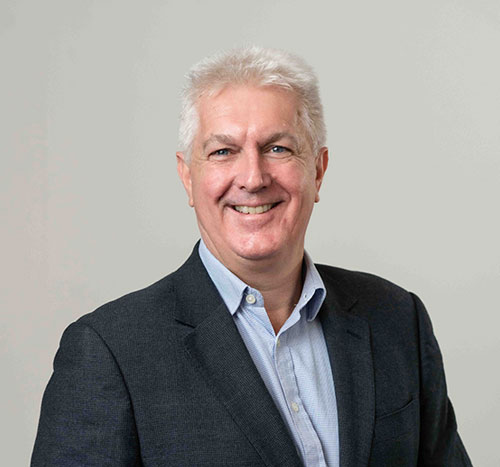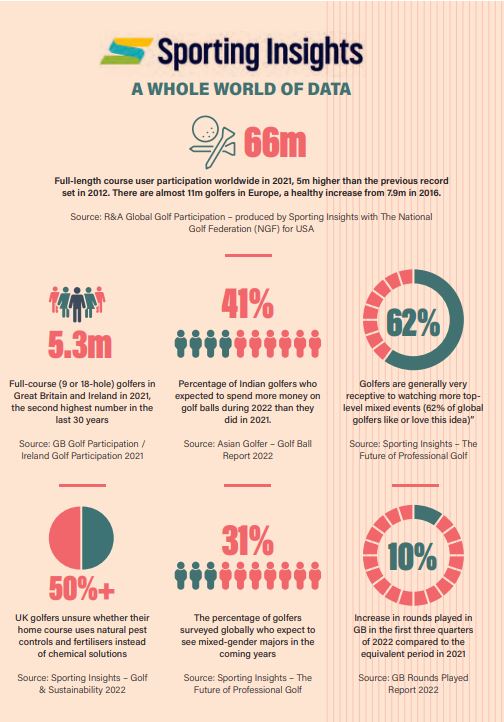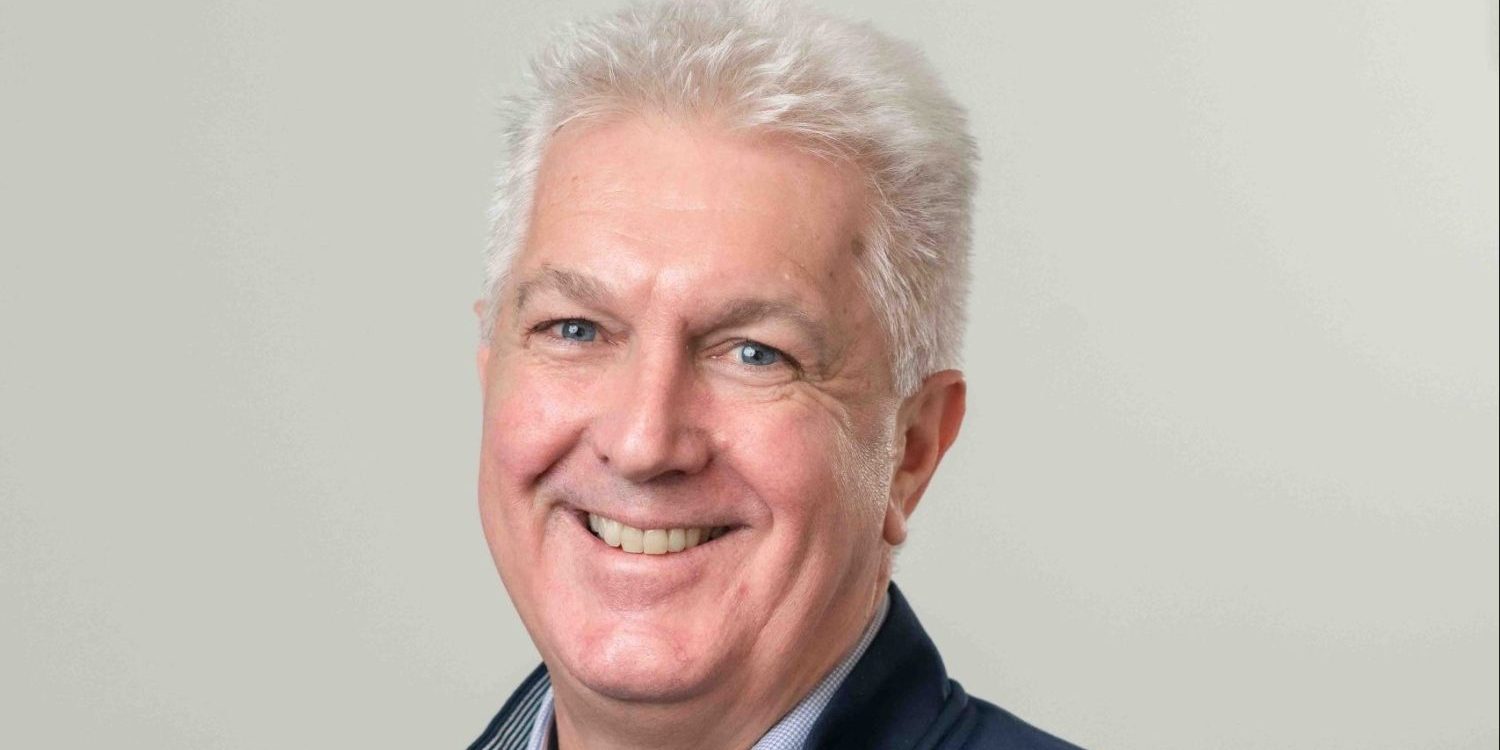This interview is taken from Golf Business Quarterly, April 2023. It can also be read in its original format here.
His company’s numbers inform and educate the golf industry and beyond. Sporting Insights’ managing director explains how his lifelong love of golf resulted in a dramatic change of career and why the greatest influence on his professional life has always been his father
The Early Days
Beginning a career
From Cambridge, Bushell joined Unilever as a management trainee, where his first role was at the Port Sunlight factory on the Wirral.
“I joined Royal Liverpool which was fabulous. There were a whole bunch of people straight from university working for Shell, Lever Bros or ICI and we all lived in Chester and had great fun and played golf at Hoylake.”
A potted history of the next few years includes a move to Unilever’s Kingston office where he qualified as an accountant which he soon realised wasn’t for him but he did ‘have a good head for numbers’. He then moved into sales and national accounts and, from there, he was headhunted by SmithKline Beecham where he ran the Macleans toothpaste portfolio.
It was around this time that his wife became pregnant with their first son, Tom, who, after a health scare, arrived safely while Bushell’s interest in golf would soon go on to new levels.

Entering the Golf Industry
“I remember thinking what am I doing working in gum health and
gingivitis? I saw an advert in a magazine called Golf Weekly for a marketing manager for Ben Sayers and ProQuip. I sent off my CV to Mike Johnson-Hill, who would go on to become chairman of Galvin Green, and I got the job in January 1997. I loved all elements of sport but I didn’t know how to do it professionally. I did love brands having worked at Unilever and SmithKline. I had done 11 years of brand work and fast-moving goods training before I joined the golf industry so it wasn’t like I went straight in.”
In 1997, the Ryder Cup was being held at Valderrama in Spain and captain of the European effort was their talisman of many years and everybody’s hero, Seve Ballesteros. ProQuip would provide the home team with their waterproofs and Bushell would get to work with his boyhood idol.
“I had got Seve’s autograph at the Double Diamond tournament at Gleneagles in the 70s and he and Jack were my golfing heroes.
The production director and I presented the suit to Richard Hills and team at the European Tour and got the sign-off. It was a new fabric which became the Ultralite range for ProQuip and we only had two colour ways; midnight blue, which was Seve’s colour, with yellow-gold highlights around it which was the European colours. If he didn’t like the colour we were in trouble as it was so new and almost the first full run off the production line. It was a very lightweight and single-skin waterproof. It poured with rain that week and Europe won, so it was a huge success for ProQuip.”
Ben Sayers and ProQuip were originally part of Grampian Golf before becoming the Caledonian Golf Group where Bushell was the marketing director. Another ground-breaking venture included the launch of the Srixon golf ball into the UK. Bushell would travel to their headquarters in Kobe in Japan and, before long, one of the game’s best-known ball brands was born.
“Mike (Johnson-Hill) and I travelled to the Sumitomo Rubber Industries – the name Srixon comes from that (SRI), the ‘X’ stands for the future and ‘ON’ is Japanese for going forwards. They produced the Dunlop ball at the time and an earthquake knocked over the ball factory so they had to move production to Pennsylvania and the quality of ball was not so good. When Kobe was operational again, my understanding is they launched the New Breed ball in Japan and, once they were confident enough, they branded it as Srixon.
“We did the licence with Sumitomo to launch it in the UK at the end of 1997 and that was the start of Srixon. They came up with the Hot Face drivers so every time anyone sold a driver a commission was paid to Srixon and that allowed them to develop the funding of the ball.”
The SMS Years
On the Covid Effect
We have to be careful how we phrase this but participation in golf has certainly benefited from Covid. It was one of the first sports to open again in May 2020 and people who would do other things with their time suddenly found that they could play in a bubble and families played together. We went from 3.1 million participation on full-length courses in 2019 to 5.2 million the following year. Female participation went from 15 to 20 per cent and, of those, 25 per cent were new to golf, so suddenly we had this massive increase. Prior to 2020 the height of participation was 4.1 million in 2007 and now we were at 5.2. We always expected a downturn when everything opened up, but 2021 was 4.8 million so we lost 300,000, but that was still a big spike from 3.1 million prior to Covid. The R&A have done a lot of investment into the game to get more people to play more often and come together – and this is definitely working – and the focus on the physical and health benefits of the sport are really motivational. However, in this case, the upturn in participation is not a direct result of what the golf industry has done to grow the game. Covid created an opportunity that so many other sports didn’t have and our challenge now is to make sure that the sport is fit enough to ensure we don’t lose those new people to the game. I wasn’t envisaging 2022 showing too much of a drop – one reason being that people have enjoyed the benefits of it and continued playing even though they might not be playing as regularly. In 2023, we may see fewer members and more independent golfers – but then again demand for a ‘sporting home’. which is what a club can be, is strong
On Inspirations
My former chairman Stephen Proctor, who passed away in November 2021, was really inspirational. He bought Sports Marketing Surveys six months after it had been set up in 1984. He was a lawyer by trade and the family had invented the seatbelt. There was a sad story to this. He was an England international golfer, he captained Oxford in the famous match against Ted Dexter’s Cambridge, and he qualified as an amateur to play in The Open. But he never actually played, as while a passenger on a business trip in Sweden, he had a car crash in a two-seater sports car. The irony is that the car did not have seatbelts. He couldn’t play golf without using a buggy for years.
I joined him in 2000 and he was always a very good mentor with a very good brain. He would always say ‘yes’ to something and then work out how to do it. I always remember him saying that your integrity is your brand reputation, damage it once and you’re done. And I hope that anybody who you speak to in the business thinks that I’m a good person to work with and that they can trust me. I have picked up skills from various companies; Ken Allen was magnificent at sales at SmithKline Beecham, he’s now at Diageo and he was someone who really knew numbers, but Stephen was certainly the most influential
Becoming Sporting Insights
When we did the management buy-out in 2011, the trading company was Sports Marketing Surveys Inc. We didn’t want to lose the legacy of SMS but, as the businesses evolved, we were doing a lot more surveys. It’s not just a name change. For a long time, we have offered a lot more than surveys in terms of the variety of techniques we use. And for even longer we have provided not just data but insight that responds to our clients’ key challenges. Somebody introduced me in front of a conference as being from Sports Marketing Services so I hadn’t done a very good job if one of our good clients couldn’t get our name right! These days we are doing so much more than surveys and Sporting Insights is what we do – we provide insights to the sports world – so we agreed the re-brand prior to Stephen Proctor’s passing. Then we didn’t want to change it too quickly as we didn’t want to look like there was any lack of respect. We agreed when to announce it with the family and re-branded things in September 2022.
A few months in, it has gone better than we expected. We have the same colour scheme with green, blue, gold (grass, water, sand), which fits in with golf, which is where the business is originally from but with a new positioning of ‘Analytics to inspire a more active world’




